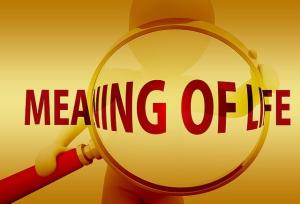
It is a basic tenet of psychology that we are “meaning making machines.” This claim is frequently validated by children, for they are incessantly asking “why”? It is insufficient to simply know what a thing is; human beings must assign it meaning in order to make sense of our world. Simply put, human beings want to know not only what something is but why.
In this paper, I will argue that much of our dysfunction and unhappiness is a product of our secular culture’s inability to adequately address the very human need for ultimate meaning. I hope to do this by first providing a definition of meaning. I will briefly argue that the two pillars of secularism – atheism and nihilism – are insufficient for the task. Finally, I will suggest that we can only find the meaning we seek by being in a proper relationship with God.
What Is Meaning?
This search for meaning has implications beyond psychology. To ask what is to begin a scientific exploration; to ask why is to commence a philosophical or even spiritual endeavor.
Generally speaking, meaning denotes an individual’s sense of understanding events in which he is engaged. Since human beings are rational creatures and since rationality entails understanding or comprehending, meaning provides a kind of epistemological compass. At an even deeper level, meaning connotes purpose. What does it mean to be, to exist? What is our intended end? Moreover, what is the source of the meaning that we seek?
These are metaphysical questions, and different philosophical positions will answer these questions in accordance with those positions. For the purposes of this paper, I will examine the metaphysical positions of atheism, nihilism, and Catholicism.
Atheism And Nihilism
On the surface, atheism and nihilism appear almost synonymous. Such a view is not entirely without merit, and the two positions (atheism and nihilism) frequently do overlap. However, atheism and nihilism are really answers to two different questions. Atheism is a response to whether God (or perhaps gods) exists. For the atheist, the answer is no.
The question nihilism is responding to is whether life has any meaning. For the nihilist, the answer is that life has no objective meaning. I say objective meaning because, for some nihilists such as Jean-Paul Sartre, existence precedes essence. That is a fancy way of saying that human beings create their own meaning.
One reason that Catholics may see little difference between atheism and nihilism is that, for Catholics, the question of meaning cannot be sundered from the existence of God.
Only God
In direct contradiction to atheism, Catholicism posits the existence of an eternal and personal God. In direct contradiction to nihilism, Catholicism asserts the principle of sufficient reason, “For everything that exists, there is a sufficient reason why it exists, either within itself or outside itself.”
To say that the reason for a thing’s existence is within itself is to say that a thing exists necessarily. That which exists necessarily cannot not exist. Therefore, such a being is eternal. This is what Catholics mean by God (at least ontologically).
Regarding meaning, if a thing does not exist necessarily, it must have a cause external to itself. Here, the principle of sufficient reason kicks in and reminds us that such a thing must have a reason for its existence. The reason why a thing was created also contains its meaning.
In this context, reason, meaning, and purpose are inexplicably intertwined. A thing is created for a particular purpose, and for that purpose, a thing has its meaning.
So, from a Catholic perspective, meaning and purpose are derived from the belief that all creation was made intentionally by God. Moreover, the belief that God has made human beings for Himself endows us with infinite dignity and meaning. Indeed, Catholicism asserts that God has created and maintains that creation out of an abundance of love.
Therefore, the ultimate purpose of life is a relationship with God. Since the soul is the essence of a living thing, only a soul is capable of that relationship. If true, then all living things endowed with a soul are called to be in relation or communion with God.
The Catholic tradition asserts that humans are made by God for God. So, what happens to those individuals who deny the existence of God and reject a relationship with Him?
Meaninglessness and Madness
Because human nature encompasses rationality, humans have a need for meaning and purpose. When this meaning and purpose are lacking, as they are in a secular environment, the consequences can be dire.
At the level of the individual, the psychological cost of a nihilistic worldview can be very high. As Dr. Charles Harper Webb observes, “An increase in nihilism plays havoc with mental health.” Nihilism can also be a side effect of psychotic depression. (See The American Journal of Geriatric Psychiatry, Volume 27, Issue 3, Supplement, March 2019, Pages 148-149).
As stated above, atheism does not necessarily entail nihilism. Nevertheless, several studies have concluded that atheists are more likely to suffer depression than religious people.
I do not want to give the impression that every single atheist or nihilist is depressed or suffers from mental illness. I am suggesting, however, that humans are made for communion with God and that a lack of that communion is detrimental to human nature. That detriment can be seen in many of the maladies of modern society.
Conclusion
We want to know what, but we also want to know why. We want, nay, we need meaning. This search for meaning and purpose cannot be satisfied without God. “You have made us for yourself, O Lord, and our heart is restless until it rests in you.” – Saint Augustine.













